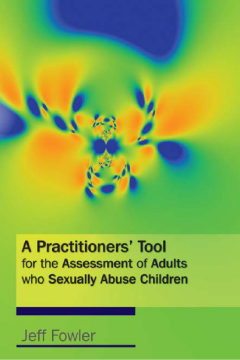
BOOK
A Practitioners' Tool for the Assessment of Adults who Sexually Abuse Children
(2008)
Additional Information
Book Details
Abstract
This book is a practical tool for the assessment of adults who sexually abuse children.
It examines the impact of sexual abuse on children, enables professionals to evaluate the risk presented by adults who have sexually abused children, and provides a framework for the assessment of parents or carers and their ability to protect their children. The book includes checklists that practitioners can use to interpret the information they collect, and is illustrated with a central case study that demonstrates how the assessment profile can be used.
This book is a helpful resource for anyone undertaking assessments that have involved the sexual abuse of children. It is also of interest to others involved in child protection, such as social workers, health professionals, teachers, and legal and criminal justice professionals.
This book provides an excellent practice tool for assessment of adults who sexually abuse children.
SWAP E-bulletin
Jeff Fowler is a qualified social worker with over 30 years' experience of working with children and families. He has worked in both residential and fieldwork settings as a practitioner and senior manager. He currently provides risk assessments for local authorities and for parties in both public and private law proceedings, and is author of A Practitioners' Tool for Child Protection and the Assessment of Parents, also published by Jessica Kingsley Publishers.
Table of Contents
| Section Title | Page | Action | Price |
|---|---|---|---|
| 1 Introduction: Towards a reflective community Development practice: Integrating the gems and wisdoms of critical thinkers | |||
| 2 Jane Addams: Practice mutual accompaniment | |||
| 3 Chimamanda Ngozi Adichie: The danger of a single story | |||
| 4 Hannah Arendt: Time to think | |||
| 5 James Baldwin: We have to go the way our blood beats | |||
| 6 Homi Bhabha: The value of colonial ambivalence | |||
| 7 Ela Bhatt: Start with women; may our action be one of nurturance | |||
| 8 Augusto Boal: Rehearsing the possible | |||
| 9 Behrouz Boochani: Bearing witness in the face of cruelty | |||
| 10 Martin Buber: Practice as an encounter | |||
| 11 Judi Chamberlin: Nothing About Us, Without Us | |||
| 12 Angela Davis: Unlock the gates of poverties and prisons | |||
| 13 Jacques Derrida: Deconstruction, a community development ‘yet-to-come’ and ‘the hauntology of justice’ | |||
| 14 Gustavo Esteva: The work of deprofessionalizing ourselves | |||
| 15 Frantz Fanon: A ‘revolution in listening’ | |||
| 16 Paulo Freire: Start with the people, but don’t stay with the people | |||
| 17 Mary Graham: ‘Place method’ and custodians of land | |||
| 18 Epeli Hau’ofa: staying close to the ground | |||
| 19 James Hillman: ‘Ensouling the world’ and notitia | |||
| 20 bell hooks: We come to theory because of our pain | |||
| 21 Myles Horton: Educators first, Organizers second | |||
| 22 John Keats: Negative capability and coming into a community | |||
| 23 George Lakoff: Don’t think of an elephant! | |||
| 24 Rosa Luxemburg: Are you willing to go to prison? | |||
| 25 Wangari Maathai: Plant trees and protect genuine democracy | |||
| 26 Joanna Macy: ‘life comes from reconnecting’ | |||
| 27 Manfred Max-Neef: Poverties, not poverty | |||
| 28 Chandra Talpade Mohanty: Pay attention to silence and erasure | |||
| 29 Fran Peavey: Questions are the art of gentle revolution | |||
| 30 Arundhati Roy: ‘… do not fragment solidarity …’ | |||
| 31 Deborah Bird Rose: Community as the ’shimmer of life’ | |||
| 32 Bertrand Russell: Community and the value of idleness | |||
| 33 E.F. Schumacher: Small is Beautiful | |||
| 34 Richard Sennett: Respect | |||
| 35 Vandana Shiva: Be a Seed Saver | |||
| 36 Georg Simmel: The importance of the triad and the stranger in making ‘community’ | |||
| 37 Linda Tuhiwai Smith: Listening to old knowledge | |||
| 38 Rabindranath Tagore: … discovering the invitation … | |||
| 39 Thich Nhat Hanh: Being, not doing | |||
| 40 Greta Thunberg: Work where there’s desire and political motivation | |||
| 41 Trinh T. Minh-ha: Recognizing difference in community | |||
| 42 Conclusion Coda – map of practice |
